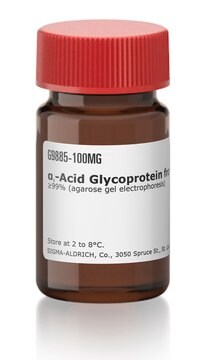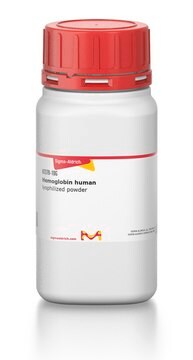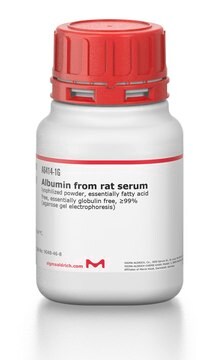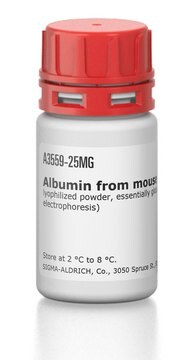A3782
Albumin from human serum
lyophilized powder, Fatty acid free, Globulin free, ≥99% (agarose gel electrophoresis)
Synonym(s):
HSA
About This Item
Recommended Products
biological source
human
Assay
≥99% (agarose gel electrophoresis)
form
lyophilized powder
mol wt
monomer calculated mol wt 66478 Da
technique(s)
ELISA: suitable
tissue culture: suitable
western blot: suitable
impurities
HIV I and HIVII, HCV and HBsAg, tested negative
≤0.1% Fatty acids
solubility
H2O: soluble 50 mg/mL
UniProt accession no.
storage temp.
2-8°C
InChI
1S/C3F8/c4-1(5,2(6,7)8)3(9,10)11
InChI key
QYSGYZVSCZSLHT-UHFFFAOYSA-N
Gene Information
human ... ALB(213)
Looking for similar products? Visit Product Comparison Guide
General description
Albumin is a known carrier of fatty acids (FA). Thus control over specific FA′s for cell culture is important, as different cell lines can differ in their sensitivity to particular fatty acids. Fatty acid-free human serum albumin (HSA) is therefore useful for cell culture studies where specific fatty acid content must be strictly controlled, so that researchers can use particular fatty acids specific to their cell lines. Fatty acid-free albumin also allows for optimal and maximum binding sites for using specific fatty acids in cell culture. The use of FA-free HSA also addresses concerns about endogenous FA′s potentially in non-FA-free HSA.
Albumin is widely used as a blocking agent in immunoassays and immunodetection procedures, and as a carrier protein for dilution of antibodies. Awareness of potential trace endogenous content of globulins / IgG in human serum albumin (HSA) is therefore important, because such trace globulins / IgG may serve as antigens for secondary antibodies in immunodetection work. This product undergoes testing for low globulin content / status as essentially globulin-free.
Application
Biochem/physiol Actions
Features and Benefits
- Fatty acid-free / low fatty acid content
- Globulin-free / low globulin content
Other Notes
Disclaimer
Storage Class Code
11 - Combustible Solids
WGK
WGK 3
Flash Point(F)
Not applicable
Flash Point(C)
Not applicable
Personal Protective Equipment
Certificates of Analysis (COA)
Search for Certificates of Analysis (COA) by entering the products Lot/Batch Number. Lot and Batch Numbers can be found on a product’s label following the words ‘Lot’ or ‘Batch’.
Already Own This Product?
Find documentation for the products that you have recently purchased in the Document Library.
Customers Also Viewed
Articles
Learn more about the cell culture supplements human serum albumin (HSA) and recombinant human serum albumin (rHSA). Explore their applications in cell culture and beyond.
This page segues to comprehensive insights on how serum albumin and other important cell culture components affect the performance of serum-free cell culture systems used for biomanufacturing heterologous proteins including monoclonal antibodies. The page introduces the in vitro chemistry and biochemistry of albumin. These insights may also be applied to ex vivo and tissue engineering applications.
Lipid Induced Insulin Resistance
Our team of scientists has experience in all areas of research including Life Science, Material Science, Chemical Synthesis, Chromatography, Analytical and many others.
Contact Technical Service








